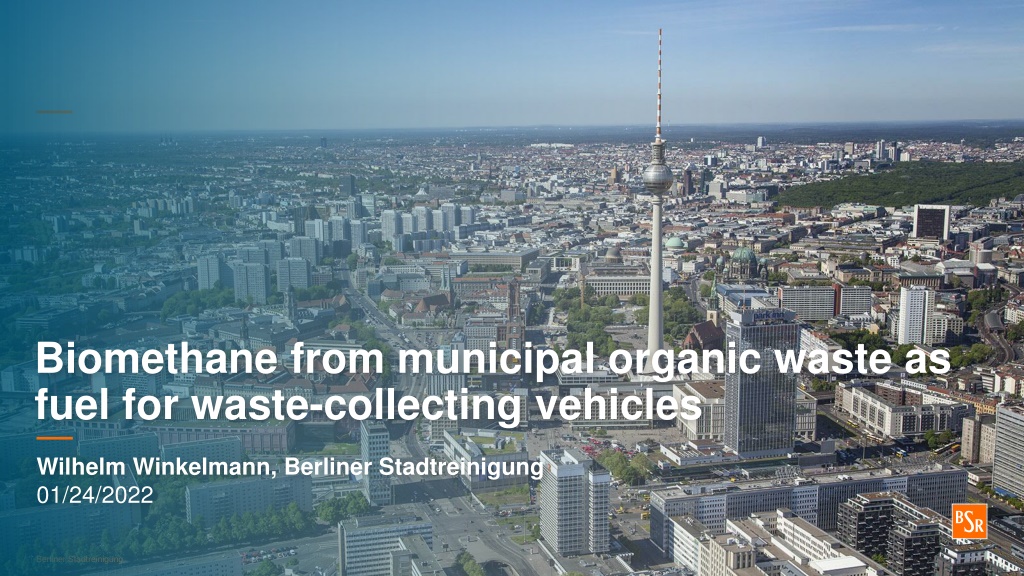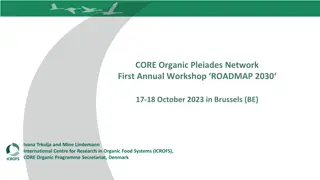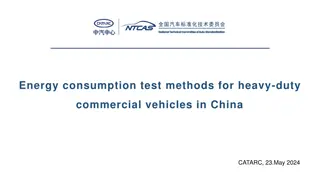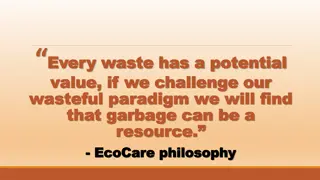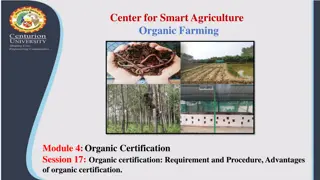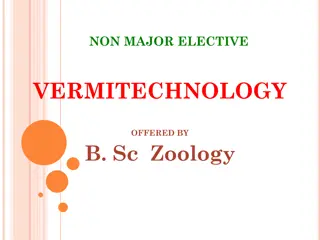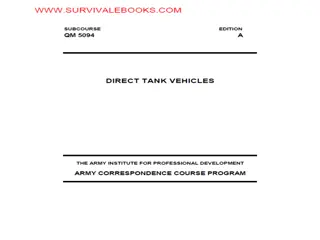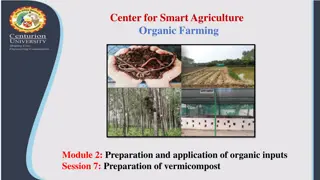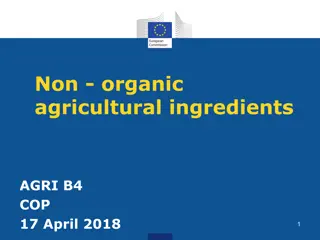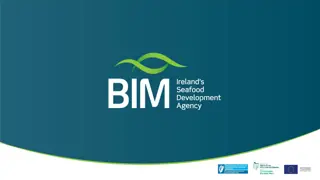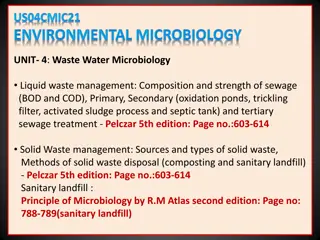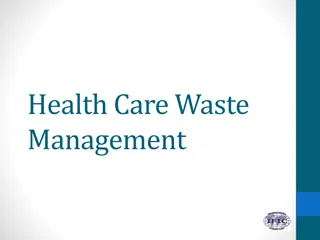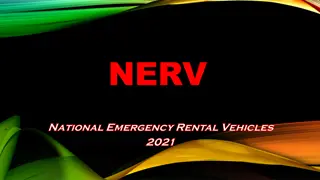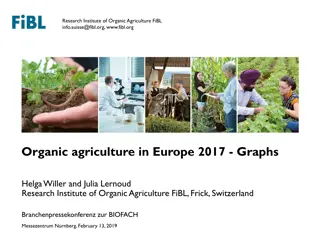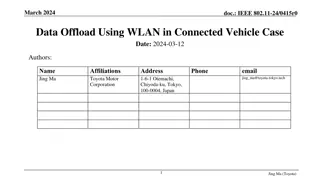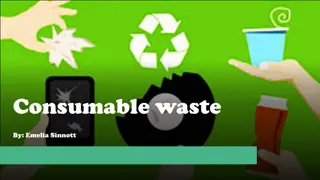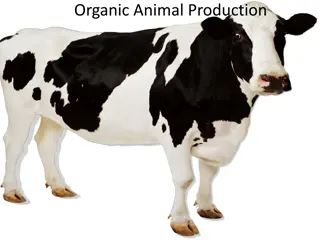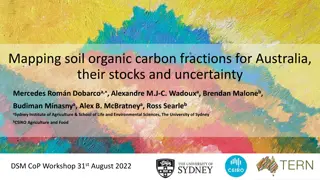Sustainable Solution: Biomethane from Organic Waste for Waste-collecting Vehicles
Explore the innovative concept of converting municipal organic waste into biomethane fuel for waste-collecting vehicles in Berlin. The process involves fermentation of organic waste, preparation of biogas, feeding into the natural gas grid, and utilization in the vehicle fleet, showcasing a unique approach towards waste management and renewable energy production.
Download Presentation

Please find below an Image/Link to download the presentation.
The content on the website is provided AS IS for your information and personal use only. It may not be sold, licensed, or shared on other websites without obtaining consent from the author. Download presentation by click this link. If you encounter any issues during the download, it is possible that the publisher has removed the file from their server.
E N D
Presentation Transcript
Biomethane from municipal organic waste as fuel for waste-collecting vehicles Wilhelm Winkelmann, Berliner Stadtreinigung 01/24/2022 Berliner Stadtreinigung
Fermentation of organic waste: Additional benefit from linked cycles 1. Disposal of organic waste (waste bins) 5. Refueling BSR vehicle fleet 6. Agricultural products e.g. plants, corn 2. Collecting of organic waste (waste bins) 5. Delivery gardening & landscaping companies; agriculture 3. Waste treatment processing and fermentation 4. Preparation of biogas and feeding into natural gas grid 4. Preparation of digestate (compost, liquid fertilizer) 2 Berliner Stadtreinigung Wilhelm Winkelmann Biomethane from municipal biowaste as fuel for waste-collecting vehicles
Development of organic waste in Berlin Berlin without Brandenburg Organic matter Fallen leaves (loose + in bags) Tree & shrub brashings Christmas trees 3 Berliner Stadtreinigung Wilhelm Winkelmann Biomethane from municipal biowaste as fuel for waste-collecting vehicles
Organic waste - Ways of treatment Organic Waste - hardly fermentable - - fermentable - compostable non-compostable wood fallen leaves organic waste tree- and shrub brashings fallen leaves organic waste leftovers e.g. canteen recycling incineration composting fermentation 4 Berliner Stadtreinigung Wilhelm Winkelmann Biomethane from municipal biowaste as fuel for waste-collecting vehicles
Concept of organic waste fermentation hydrolysis propionic acid acetic acid methane+CO2 digestate - liquid - solid small/large intestine rumen abomasum saliva substrate intake omasum organic matter 5 Berliner Stadtreinigung Wilhelm Winkelmann Biomethane from municipal biowaste as fuel for waste-collecting vehicles
Possibilities of using biogas filling into public natural gas grid biogas pipeline (micro gas grid) standard biofuel biogenous fermentable waste production of biogas biogas-processing biogas pipeline biomethane into grid withdrawal from grid other consumers biomethane filling station biogas vehicle fleet combined heat and power (CHP) combined heat and power (CHP) BSR methane filling stations electricity heat electricity heat BSR vehicle fleet 6 Berliner Stadtreinigung Wilhelm Winkelmann Biomethane from municipal biowaste as fuel for waste-collecting vehicles
Key figures 2021 Input: Area: Employees: Exhaust air: Production of raw biogas: Annual production of raw biogas: Production of biomethane: Net production of energy: Substitution of diesel fuel: Output solid aerated fermentation residue: 20,000 Mg/a (c-sequestration, compost) Output liquid digestate : CO2-reduction potential: 75,000 Mg/a organic waste from households 2.7 ha 16 40,000 m3/h 103 m3/Mg Input with 56% CH4 ~ 6 Mio. m3/a ~ 3 Mio. m3/a ~ 31 Mio. kWh/a ~ 2,5 Mio. liters/a 40,000 Mg/a (liquid fertilizer) ~ 13,800 Mg CO2/a from substitution of fuel and c-sequestration or 185 kg CO2/Mg Input 7 Berliner Stadtreinigung Wilhelm Winkelmann Biomethane from municipal biowaste as fuel for waste-collecting vehicles
Biomethane used as fuel 3 high-performance gas stations for our vehicle fleet 165 waste collection vehicles run on biomethane (= 50 % of waste collecting vehicle fleet) 467,000 Mg waste* from 1.97 Mio. private households** of the city of Berlin are being collected and transported per year with no negative effect on our climate * residual waste, organic waste (brown bin); ** www.destatis.de, survey 2020 8 Berliner Stadtreinigung Wilhelm Winkelmann Biomethane from municipal biowaste as fuel for waste-collecting vehicles
From waste to value Berliner Stadtreinigung
Proceeds from recycling provide a significant contribution to securing steady fees Steam: (incinearation plant Ruhleben) 2.3% Biomethane: (fermentation plant for organic waste) 0.5% Scrap metal (FE and NF): (incinearation plant Ruhleben, treatment of bulky waste, recycling centers) 2.1% Reduction of fees 6.0% 0.5% Paper: (recycling centers) Wood: (treatment of bulky waste, recycling centers) 0.2% Other: (e.g. old clothes, recyclables) 0.4% status: 2020 10 Berliner Stadtreinigung Wilhelm Winkelmann Biomethane from municipal biowaste as fuel for waste-collecting vehicles
Biogas plant in Berlin: Sources of proceeds Using the natural gas grid allows: price development Delivery of gas to our fleet of collecting vehicles (gas stations) Internal transfer price approx. 26 GWh/a 2.2 GWh/a electricity and heat Delivery of gas to CHP plant Internal transfer price External revenue (Advanced fuels) Selling of biomethane approx. 2.3 GWh/a Quota trading 38. BImSchV / RED II approx. 26 GWh/a or approx. 6 Tsd. Mg CO2- q. Fuel quota trading 11 Berliner Stadtreinigung Berliner Stadtreinigung Wilhelm Winkelmann Biomethane from municipal biowaste as fuel for waste-collecting vehicles
Conclusion and Prospect The high level of contributing households to the organic waste collection reduces costs of the collection system Chosen concept helps to reduce emissions of logistics (CO2, noise, PM 10-particles) The recycling of digestate improves the humus balance and reduces the need for artificial fertilizers Prices for utilization of compost and liquid digestate increase because of aggravating legal developments Secured access to the public natural gas grid by law is essential (storage function of grid) Political strategies for the transport sector are changing; the legislator pushes the development and usage of e-fuels (fuels from renewable resources). But Daimler Comp. stops production of CNG-trucks for waste collection Little extra money (increasing) from selling quotas for renewable fuels (BioKraftQuG / RED II) Video about this concept: https://www.bsr.de/biogasanlage-22250.php 12 Berliner Stadtreinigung Wilhelm Winkelmann Biomethane from municipal biowaste as fuel for waste-collecting vehicles
BACKUP 14 Berliner Stadtreinigung Wilhelm Winkelmann Biomethane from municipal biowaste as fuel for waste-collecting vehicles 14
A big city can be supplied with electricity and heat from the energy in Berlin's waste (Status 04.2021) fermentation plant for organic waste processing of waste wood and bulky waste incineration plant Ruhleben 3 landfill sites with CHP 2 mechan.-physic. stabilization system plants steam approx. 1.5 Mio. Mg/a gas from landfill sites: approx. 22 Mio. m3/a substitute solid fuel: approx. 187,000 Mg/a substitute solid fuel: approx. 60,000 Mg/a biomethane: approx. 31,800 MWh/a approx. 25,700 MWh for substitution of von Diesel fuel; approx. 2,200 MWh for generation of electricity and heat CHP approx. 210 GWh electricity approx. 740 GWh district heating approx. 42 GWh electricity, approx. 21 GWh district heating approx. 194 GWh electricity approx. 70 GWh electricity Covers need for electricity of approx. 12 % of average households of Berlin and the need for district heating of approx. 7.4% of households of Berlin with a district heating connection 15 Berliner Stadtreinigung Wilhelm Winkelmann Biomethane from municipal biowaste as fuel for waste-collecting vehicles 15
